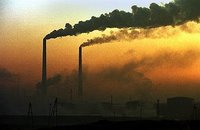 Five out of the ten most polluted places in the world this year are to be found in the Former Soviet Union, according to a list published by the Blacksmith Institute. No, it's no beauty paget, even if the list is an annually recurrent event, shedding light upon some of the greatest man-made environmental disasters in history.
Five out of the ten most polluted places in the world this year are to be found in the Former Soviet Union, according to a list published by the Blacksmith Institute. No, it's no beauty paget, even if the list is an annually recurrent event, shedding light upon some of the greatest man-made environmental disasters in history.According to the UN, 20% of premature deaths in the world may be ascribed to environmental factors. "There are some towns where life expectancy approaches medieval rates, where birth defects are the norm not the exception. In other places children's asthma rates are measured above 90%, or mental retardation is endemic. In these places, life expectancy may be half that of the richest nations", the report states.
In Russian Dzerzhinsk, average life expectancy among men is 42 years and among women 47 years. This was one of the places where the USSR produced its chemical weapons during the Cold War. Norilsk houses the world's largest nickel producer, and life expectancy for factory workers is 10 years below the Russian average. In Rudnaya Pristan and Dalnegorsk, lead poisoning is endemic due to emissions from local lead mines. Levels of lead in children's blood are between 8 and 20 times higher than maximum allowable rates in the US.
Mailuu-Suu in Kyrgyzstan presents some of the highest figures of nuclear radiation in the world, due to the waste from soviet time uranium mining. The situation may also worsen as earthquakes threaten to negatively affect containment of radioactive waste in this area of high seismic activity. The situation sets the security of large tracts of Central Asia in peril, while the Mailuu-Suu river might carry great quantities of highly radioactive sediments to the Ferghana valley - the region's most densely populated area.
 The most well-known place on the list is probably Chernobyl in Ukraine. Even 20 years after the accident, radioactivy is on such high levels to remain life hazardous during lengthy exposure. The 19 mile exclusion zone remains uninhabitable, and the number of thyroid cancer cases among people in exposed areas is on highly elevated. Even if efforts are made to improve the environmental situation, there are fears of a new disaster if the sarcophagus - the concrete inclosure of the reactor - collapses, or if nuclear waste leaks into the groundwater.
The most well-known place on the list is probably Chernobyl in Ukraine. Even 20 years after the accident, radioactivy is on such high levels to remain life hazardous during lengthy exposure. The 19 mile exclusion zone remains uninhabitable, and the number of thyroid cancer cases among people in exposed areas is on highly elevated. Even if efforts are made to improve the environmental situation, there are fears of a new disaster if the sarcophagus - the concrete inclosure of the reactor - collapses, or if nuclear waste leaks into the groundwater.That the effects of soviet reign laid waste to large tracts of the Eurasian continent should be commonplace knowledge nowadays. There should thus be no wonder that five out of the ten most polluted places in the world are located in the former USSR. Still, have current rulers of these states learnt from historical mistakes? No, in many cases not. Recently, ideas of turning the rivers of Siberia are again becoming fashionable in both Russia and Kazakhstan. The last time this was tried - during the 1960s "Virgin Lands" project - it led to an environmental disaster of epic proportions. It seems that even the most obvious is beyond reach for these people to fathom. Perhaps, the truth of the matter is that too many political leaders in these countries simply do not care, come what come may.



2 comments:
Agree with the statement that the scary ideas from the past start haunting those in power in Russia and other CIS. But what is the cause to this?
I can put one suggestion forward - there is a lack of other fresh ideas, intellectual alternatives. Bright minds emigrated and are driving Western economies, bright minds that stayed behind are busy making IPOs. Who is producing ideas? Old guard or those with limited horizon.
Russia and CIS could have converted the experience gained from cleaning up and reversing mistakes of communism into a precious knowledge capital, in the form of data, professionals, cases, SMEs specializing in diverse aspects of the issue, - both tangible and intangible assets. Russian specialists could have been doing a flamboyant business on the back of this assets in China, Vietnam, India etc. Yet nothing is in place and all the knowledge is being created in Western Europe if not States.
Great blog! I would want to sell books in my blog as well. Would you mind shearing a "how to"? I am a new blogger so would appreciate it very much.
Post a Comment